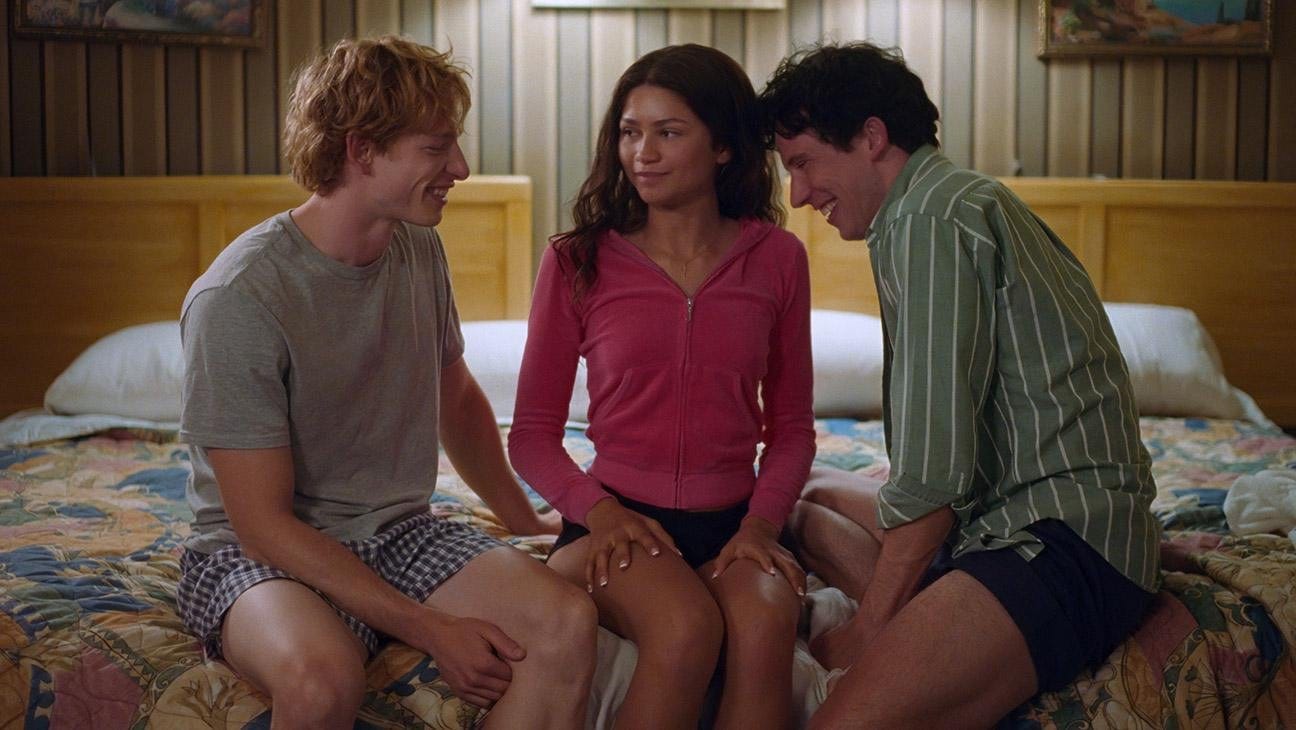Finally, my thoughts on Challengers (2024) for you all.
Let’s get into it:
Rope (1948, dir. Alfred Hitchcock) — First things first, every movie should run an hour and twenty minutes. Alfred Hitchcock, pithy king. Second things second, per a Letterboxd rando, “this movie’s got it all…murder, gay subtext…jimmy stewart yelling.” SO true.
Hitchcock’s first color movie, Rope draws its inspiration from the infamous Leopold and Loeb murder case. ICYMI, in 1924, University of Chicago students Nathan Leopold and Richard Loeb kidnapped and murdered 14-year-old Bobby Franks in a preening attempt to commit the perfect, motiveless murder. The pair grew up together on Chicago’s South Side, with their relationship taking a sexual turn around 1921. Leopold maintained a fascination with Friedrich Nietzsche’s concept of the “Übermensch,” or “Superman,” an enlightened individual who embodies ten key values including creativity, self-mastery, and courage. Leopold and Loeb began partaking in petty theft in their pursuit to embody that ideal, a misguided approach driven by the former’s philosophical interpretations. When their crimes failed to garner the press attention they desired, the pair ratcheted up their efforts by killing Franks.
Rope opens on its fictional version of this real-life moment, with Brandon Shaw (played by John Dall) and Phillip Morgan (played by Farley Granger) strangling their former prep school classmate, David Kentley (played by Dick Hogan), in their Manhattan penthouse apartment, then stuffing his corpse into a wooden chest and preparing for a dinner party. Brandon and Phillip’s unassuming guests include David’s father (played by Sir Cedric Hardwicke); his fun astrology aunt, Anita Altwater (played by Constance Collier; another favorite Letterboxd review: “those gays knew it was over when the uninvited wine aunt who does horoscopes showed up”); his fiancée, Janet Walker (played by Joan Chandler); Janet’s ex and a former friend of David’s, Kenneth Lawrence (played by Douglas Dick); and Brandon and Phillip’s old prep school housemaster Rupert Cadell (played by Jimmy Stewart), who first introduced them to the notion of Nietzsche’s Superman. As the evening goes on, tension boils as the conversation circles around David’s absence, each loop growing narrower and narrower.
The film stems not only from the Leopold and Loeb case, but also from an eponymous 1929 play penned by English playwright Patrick Hamilton (also the mastermind behind the theatrical basis for Gaslight (1944), which I reviewed back in December). Per Roger Ebert: “The play [Rope] depended, for its effect, on the fact that it was one continuous series of actions. Once the characters have entered the room, there can’t be any jumps in time, or the suspense will be lost. The audience must know that the body is always right there in the trunk. The play appealed to Hitchcock’s sense of the macabre and his fascination with situations involving the inconvenience of dead bodies. But in translating the play to the screen, he had to deal with that unity of time and space. All of the events had to take place in one uninterrupted act, and he arrived at the novel idea of shooting the movie without any visible cuts, so that it would look like one continuous shot.” In the end, Hitchcock delivered a film with ten total shots with invisible cuts, a stroke of technical ingenuity that Ebert deems unnecessary, but that I applaud. Through his single-take approach, the Master of Suspense creates a kind of claustrophobia that, paired with its pacing, puts its characters — and, by extension, the audience — in a propulsive pressure cooker.
Where to Watch: Amazon Prime Video (premium subscription)
Perfect Days (2023, dir. Wim Wenders) — The things this film did for my blood pressure (non-derogatory). +1 to the Letterboxd rando who said: “the cannes best actor award wasn’t enough kōji yakusho needs a nobel peace prize.”
A co-production between Japan and Germany, Perfect Days chronicles a series of days in the life of Tokyo public toilet cleaner and Taurus-coded king Hirayama (played by Kōji Yakusho). Hirayama collects cassette tapes that are Extremely Aligned with my Musical Taste (Patti Smith, Lou Reed, The Kinks, The Velvet Underground, etc.), reads authors ranging from William Faulkner to Aya Kōda. His daily routine includes tending to plants and photographing trees, as well as meticulously scrubbing every toilet in Tokyo’s Shibuya ward. He draws not only immense pleasure from music, literature, and nature, but also satisfaction from his work.
My friend Cayla (hi, Cayla!) aptly called Perfect Days meditation as a movie. From flickering tree reflections to grayscale dreams, Wim Wenders’s directorial style accentuates the minutiae that accumulates to form life’s meaning. Each morning, Hirayama listens to a different song on his drive to work, accompanied by the empty streets. In one particularly memorable sequence, Hirayama’s disgruntled Gen Z coworker, Takashi (played by Tokio Emoto), tries to convince him to sell his beloved cassette tapes for extra cash. They get as far as a valuation at a local music shop before it goes unspoken that the joy and mindfulness elicited by a Lou Reed tape exceeds its dollar value.
The film adopts a cyclical narrative. Variants — from Takashi’s friend, Aya (played by Aoi Yamada), to Hirayama’s niece, Niko (played by Arisa Nakano) — float in and out of a schedule as it repeats. These people, these punctures in the pattern, shed light on Hirayama’s past and present, reveal the contours that shape his selfhood; slowly, methodically, a complete picture comes into view.
Wenders concludes the film with an emotional crescendo, the ultimate puncture in the pattern. In his review for The Hollywood Reporter, David Rooney compares the scene to the closing of Call Me By Your Name (2017). He writes: “Wim Wenders ends his eloquent and emotionally rich Japanese drama, Perfect Days…held tight on the extraordinarily expressive face of Koji Yakusho as his character drives through Tokyo reflecting on the rewards and perhaps also the regrets of his life…The song that this resolutely analog man is listening to on his car cassette player is a Nina Simone standard that has become one of the most overused tracks in contemporary movies. But it fits the scene so precisely and captures the way in which the character moves through his small pocket of the world with such exactitude, it feels almost like hearing the song for the first time.”
Where to Watch: Hulu (subscription), Amazon Prime Video ($3.99)
The Birdcage (1996, dir. Mike Nichols) — Truly the perfect film to combat crippling Sunday scaries. I did see this movie in like fourth grade at a friend’s house, but I’m reviewing it now since last month marked my first adult rewatch.
This 90s classic from Mike Nichols — yes, Mike Nichols of The Graduate (1967) and Who’s Afraid of Virginia Woolf? (1966) — operates as an American adaptation of critically acclaimed French film La Cage aux Folles (1978). In Nichols’s interpretation, Armand Goldman (played by Robin Williams in a rare straight-man role), owner of South Beach drag club The Birdcage, and his partner and its star, Albert (played by national treasure Nathan Lane), find themselves faced with a conundrum when their son, Val (the true villain of the movie, played by Dan Futterman; +1 to the Letterboxd rando who wrote: “imagine having robin williams and nathan lane as your dads and treating them the way val does in this movie…could NOT be me”), returns home from college and announces his intention to marry Barbara, the daughter of a conservative politician (played by Calista Flockhart). Farcical hijinks ensue as they attempt to make a positive impression on Barbara’s right-wing family.
This film has a star-studded cast that delivers in spades. Beyond Robin Williams and Nathan Lane, Christine Baranski, Hank Azaria, and Gene Hackman (of my new favorite film, The Conversation (1974)) appear as Val’s biological mother, Armand and Albert’s Guatemalan housekeeper, and Barbara’s father, respectively. Come for Robin Williams and Nathan Lane, stay for Gene Hackman dancing to Sister Sledge’s “We Are Family” (1979) in drag.
Where to Watch: Amazon Prime Video (premium subscription)
Challengers (2024, dir. Luca Guadagnino) — “Now, that’s cinema, baby !!!” -me to five different friends after leaving my screening of Challengers (2024) at Village East
In case you’ve been living under a rock, this tennis throuple movie from Call Me By Your Name (2017) director Luca Guadagnino traces the decade plus-long love triangle between rising tennis star-turned-coach Tashi Duncan (played by Zendaya), tennis pro Art Donaldson (played by Mike Faist), and B-tier player Patrick Zweig (played by my king, Josh O’Connor). The narrative coalesces around a match between Art and Patrick at the ATP Challenger Tour in New Rochelle, but not before a mid-aughts look back at the story behind their relationships to Tashi — and each other.
Sex and tennis become one and the same over the course of the story. For The New Yorker, Justin Chang explains: “If the movie makes little distinction between sex scenes and non-sex scenes, it’s because Guadagnino knows that people can’t be readily separated into minds and bodies. He sees his characters whole, libidos and all, and their every expression and gesture throws off a coruscating erotic energy. The effect isn’t titillating; it’s clarifying. In sex, as in tennis, anticipation is everything…But with anticipation can also come deflation; Guadagnino treats sex as a conversation, and any conversation can go south.” The characters’ desires — embodied impressively by Zendaya, Faist, and O’Connor — fluctuate along with their athletic success, with Manohla Dargis, in her New York Times review, noting how each actor “brings emotional and psychological nuance…whatever the characters’ current configuration.”
Guadagnino, who famously considers tennis boring, finds the fuel for this film in making the matches “subjective,” anchored in emotional stakes that span beyond the sport, per an interview with Little White Lies. The tension in the tennis, especially the final face-off between Art and Patrick, feels reminiscent of Alfred Hitchcock’s Strangers on a Train (1951).
In the climax of Hitchock’s 1951 classic, tennis pro Guy Haines (played by Farley Granger) and peppy psychopath Bruno Anthony (played by Robert Walker) find themselves on the precipice of simultaneous victories. Guy faces off at Forest Hills, while Bruno tries to retrieve Guy’s lighter from a storm drain. Both race against time; Guy looks to finish the match as quickly as possible, evading police arrest and beating Bruno’s attempt to plant the lighter as false evidence at an amusement park. In Challengers, Art seeks to gain a resurgence of confidence — in his abilities, in his relationship with Tashi — while Patrick stands on the precipice of renewed relevance. Tennis becomes a language of urgency in Strangers on a Train, of healing in Challengers, with the human subtext surpassing the mechanics of the sport itself.
On an aesthetic level, Guadagnino implements a direct nod to Hitchcock. Both films feature a packed stadium swinging heads back and forth, following the ebb and flow of a match, while one individual, the psychological puppet master — Tashi in Challengers, Bruno in Strangers on a Train — maintains focus. Guadagnino acknowledges the Master of Suspense’s influence in his Little White Lies interview, explaining: “I was definitely thinking a lot about the strategies of Alfred Hitchcock, when it comes to the way in which an interaction is cultivated through visual means, which in turn creates tension…But I would say that the thing that, now that I go back with my memory, really was amusing for me when I read the script, I said, ‘I think this is a script that Mike Nichols would have probably loved to make.’ So I thought, how do we create a movie that is a great drama, and could also be a great comedy of manners, in the mode of Nichols.”
Writer Justin Kuritzkes — famously the husband of Past Lives (2023) filmmaker Celine Song — has noted his and Guadagnino’s shared love of Nichols’s filmography in interviews as well. In speaking with with GQ, Kuritzkes points to the particular influence of Carnal Knowledge (1971). The coming-of-age film chronicles the sexual development and subsequent romantic exploits of two men, Nice Guy™ Sandy (played by Art Garfunkel, from whom Mike Faist’s Art Donaldson draws his name in Challengers) and Jonathan (played by Jack Nicholson with the same unwashed sex appeal that characterizes Josh O’Connor’s Patrick), across the decades, through the prism of their shared fixation on the same woman, Susan (played by Candice Bergen). But, as interviewer Raymond Ang notes: “In their [Kuritzkes and Guadagnino’s] version, of course, Jack Nicholson and Art Garfunkel would have some locker room fun of their own.”
Guadagnino goes to great lengths to accentuate the intensity of tennis and, by extension, of the characters’ relationships to the sport and each other. “At one point, the camera becomes the ball, and we hurtle with it from racquet to racquet, until the perspective changes to give us a striking aerial view of the court. For another shot, of Art leaping over the net, the actor also had to jump over Guadagnino, who filmed him from below. This frenetic energy persists even when the characters stop playing,” writes Tyler Foggatt in another piece for The New Yorker. This approach, for me, enhances the film’s dynamism, while Trent Reznor and Atticus Ross’s sound design carries more of a mixed impact. My one critique of Challengers centers not on the quality, but the volume, of the pair’s techno-classical score. It intentionally eclipses the characters’ dialogue at points and, in a manner somewhat similar to Todd Haynes’s May December (2023), “disrupt[s] the flow of the film rather than supplementing it” from my perspective.
Where to Watch: ~a theater near you~ — for my New York-based subscribers, I highly rec seeing it at Syndicated, where you can order food and cocktails to your seat
The Lavender Hill Mob (1951, dir. Charles Crichton) — This forgotten crime comedy, which clips along at a tight 80-minutes, opens in Rio as former London bank clerk Henry Holland (played by Alec Guinness) dines out with a British visitor. He delves into the story of the gold bullion robbery that changed his life, establishing the film’s framing device (but not before a random two-minute cameo from Audrey Hepburn). The ensuing hour plus zips from London to Paris and back again, teasing out the scheme concocted by Henry, who oversees gold bullion deliveries, and his partner, Al Pendlebury (played by Stanley Holloway), who manufactures seemingly cheap souvenirs that get sent abroad.
The Ealing Studios film holds a 100% score on Rotten Tomatoes and took home the 1953 Academy Award for Best Original Screenplay (then Best Writing, Story and Screenplay). I had never heard of it until Film Forum announced a 4K Restoration last month and found myself charmed by what The Times aptly calls a “twisty crime caper and affectionate character study…one of the great London movies, with location shooting around Blackfriars, Ealing, and Cheapside making an unwitting star of the capital city.”
Where to Watch: Amazon Prime Video (premium subscription), Roku (premium subscription)
That’s all for now!
xo,
Najet













